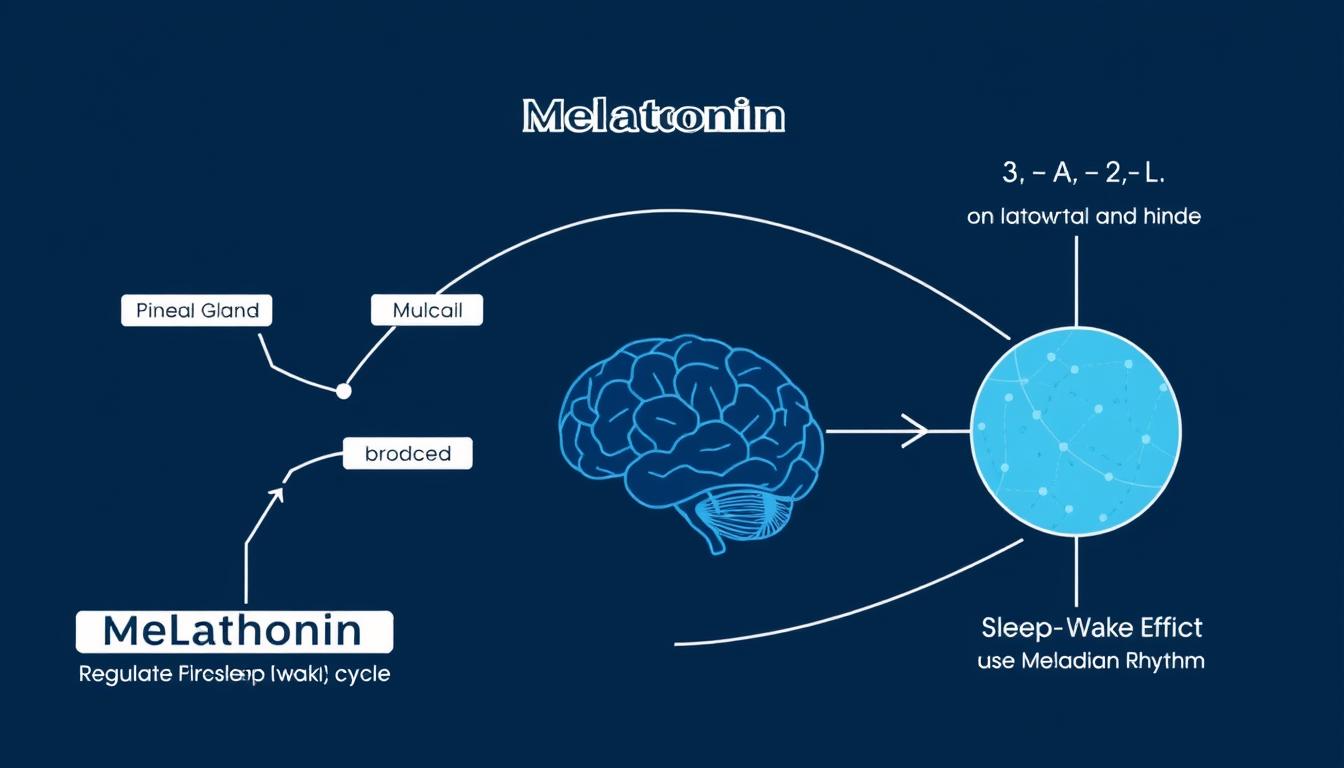How Long Does It Take for Melatonin to Work? A Science-Backed Guide
If you’ve ever struggled to fall asleep, you may have considered taking melatonin supplements. As one of the most popular over-the-counter sleep aids in the United States, melatonin helps millions of people improve their sleep quality. But how long does it take for melatonin to work? This comprehensive guide explores the science behind melatonin’s effectiveness, factors affecting its absorption, and what you can expect when taking this supplement.
What Is Melatonin and How Does It Work?
Melatonin is produced by the pineal gland and helps regulate your sleep-wake cycle
Melatonin is a hormone naturally produced by the pineal gland in your brain. It plays a crucial role in regulating your circadian rhythm—your body’s internal clock that controls when you feel sleepy and when you feel alert. When darkness falls, your body naturally increases melatonin production, signaling that it’s time to sleep.
The pineal gland transforms serotonin into melatonin when your internal clock sends the right signals. As melatonin levels rise in your bloodstream, your body temperature and blood pressure begin to lower, creating the perfect conditions for sleep. This natural process is why maintaining a consistent sleep schedule and proper sleep hygiene is so important.
While your body produces melatonin naturally, many people take supplements to help with various sleep issues, including:
- Insomnia
- Jet lag
- Shift work sleep disorder
- Delayed sleep phase syndrome
- Sleep problems related to certain medical conditions
How Long Does It Take for Melatonin to Work?
When you take a melatonin supplement, it doesn’t work instantly. Most people find that melatonin begins to take effect within 20 to 40 minutes after ingestion. However, the exact timing can vary based on several factors.
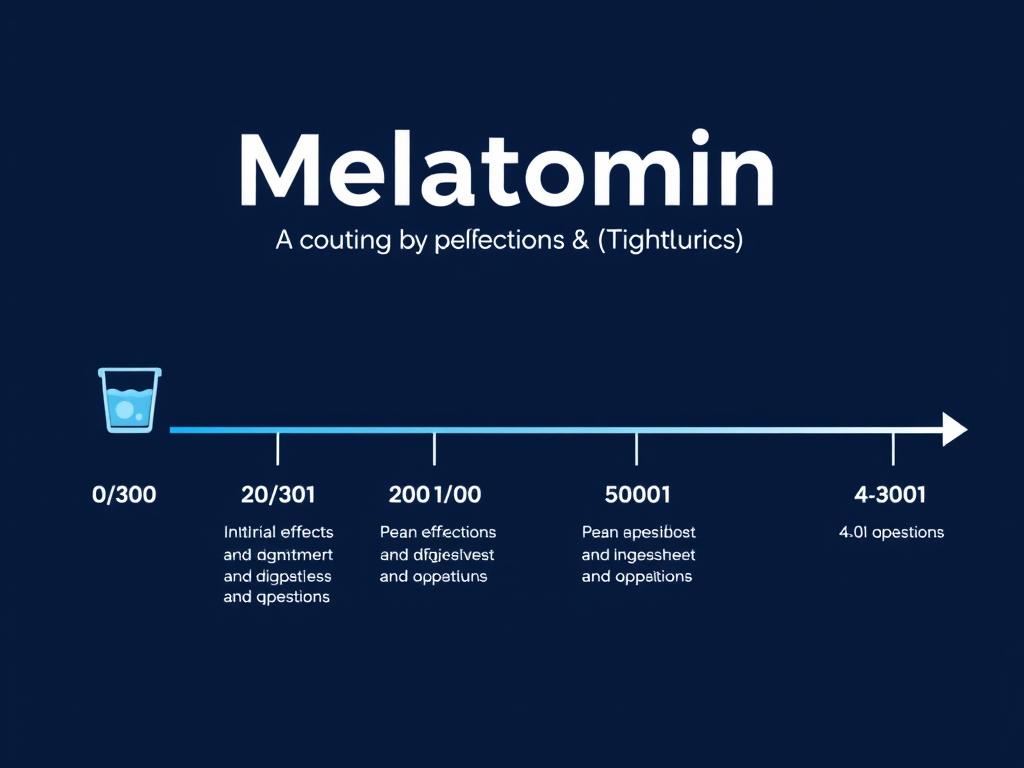
For most people, melatonin reaches its peak concentration in the bloodstream about 1 hour after taking it. This is why sleep experts typically recommend taking melatonin 1 to 2 hours before your desired bedtime. By timing your dose correctly, you can align the peak effectiveness of the supplement with when you want to fall asleep.
Factors Affecting How Quickly Melatonin Works
Several factors can influence how quickly melatonin takes effect in your body:
Dosage
Higher doses don’t necessarily work faster or better. In fact, taking too much melatonin can disrupt your sleep cycle and cause side effects. Most experts recommend starting with a low dose (0.5-3 mg).
Age
As you age, your metabolism slows down, which can affect how quickly your body processes melatonin. Older adults may find that melatonin stays in their system longer.
Body Composition
Your height, weight, and body composition can influence how quickly you absorb melatonin and how it affects you.
Food Intake
Taking melatonin with food, especially high-fat meals, may delay absorption. For faster results, take melatonin on an empty stomach.
Individual Metabolism
Everyone’s body processes substances differently. Your personal metabolism rate affects how quickly melatonin begins working.
Other Medications
Certain medications can interact with melatonin, either speeding up or slowing down its effects. Always consult with a healthcare provider about potential interactions.
Comparing Different Forms of Melatonin
Melatonin supplements come in various forms, each with different absorption rates and durations of effectiveness. Understanding these differences can help you choose the right type for your specific sleep needs.
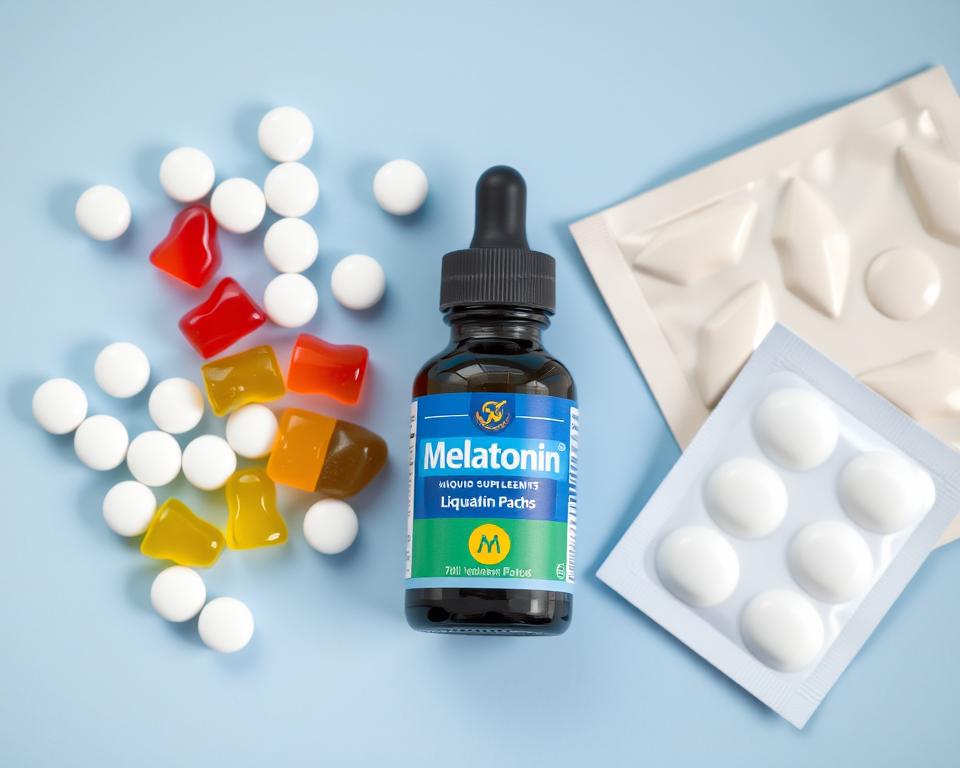
| Form | Onset Time | Peak Effect | Duration | Best For |
| Standard Pills | 30-40 minutes | 60 minutes | 4-5 hours | Difficulty falling asleep |
| Extended-Release Pills | 30-60 minutes | 90+ minutes | 6-8 hours | Staying asleep/night waking |
| Sublingual Tablets | 15-30 minutes | 45 minutes | 4 hours | Quick sleep onset |
| Gummies | 30-45 minutes | 60-75 minutes | 4-6 hours | Those who dislike pills |
| Liquid | 20-30 minutes | 45-60 minutes | 4-5 hours | Faster absorption |
| Patches | 45-60 minutes | 120+ minutes | 6-8 hours | Sustained release throughout night |
Standard vs. Extended-Release Melatonin
Standard melatonin pills dissolve quickly in your body, releasing all the melatonin at once. This can be helpful if you have trouble falling asleep initially. Extended-release (also called slow-release or time-release) melatonin dissolves gradually, releasing melatonin over several hours. This mimics your body’s natural melatonin production and can be particularly helpful if you tend to wake up during the night.
Fast-Acting Forms
If you need melatonin to work quickly, consider sublingual tablets or liquid melatonin. These forms bypass the digestive system and enter your bloodstream more directly, resulting in faster onset times. Sublingual tablets dissolve under your tongue, while liquid melatonin can be absorbed through the tissues in your mouth.

Optimal Melatonin Dosage Recommendations
Finding the right melatonin dosage is crucial for effectiveness and safety. Sleep specialists generally recommend starting with the lowest possible dose and adjusting as needed.
Important: Melatonin is not regulated by the FDA as a drug but as a dietary supplement. This means the actual amount of melatonin in products may vary from what’s listed on the label. Always purchase melatonin from reputable manufacturers.
Recommended Dosages by Age Group
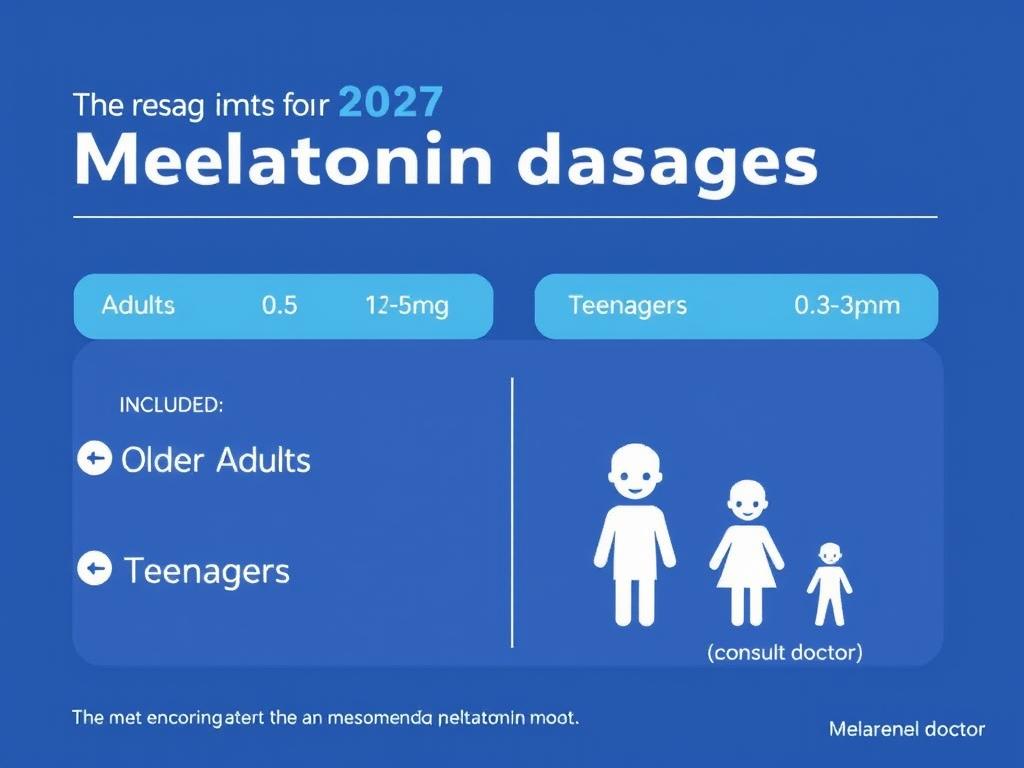
Adults
For most adults, a dosage between 0.5 and 5 mg is recommended. Start with 1 mg and increase gradually if needed. Higher doses don’t necessarily work better and may cause side effects.
Older Adults
Older adults are often more sensitive to melatonin. A lower dose of 1-2 mg is typically recommended. Metabolism slows with age, so melatonin may stay in the system longer.
Children
Melatonin use in children should always be supervised by a healthcare provider. Dosages are typically lower than for adults and should be determined by a doctor based on the child’s specific needs.
“The effectiveness of melatonin depends more on timing than on dose. Taking a lower dose at the right time is more effective than taking a higher dose at the wrong time.” – Dr. Luis F. Buenaver, Ph.D., Johns Hopkins sleep expert
How Long Does Melatonin Last in Your System?
Understanding how long melatonin stays in your system is important for planning your sleep schedule and avoiding morning grogginess. On average, melatonin has a half-life of about 40-60 minutes. This means that half of the melatonin is eliminated from your body within this timeframe.
Typically, melatonin stays in your system for about 4-8 hours, though this can vary based on several factors. For most people, the effects of melatonin wear off by morning, but some may experience lingering drowsiness, especially with higher doses.
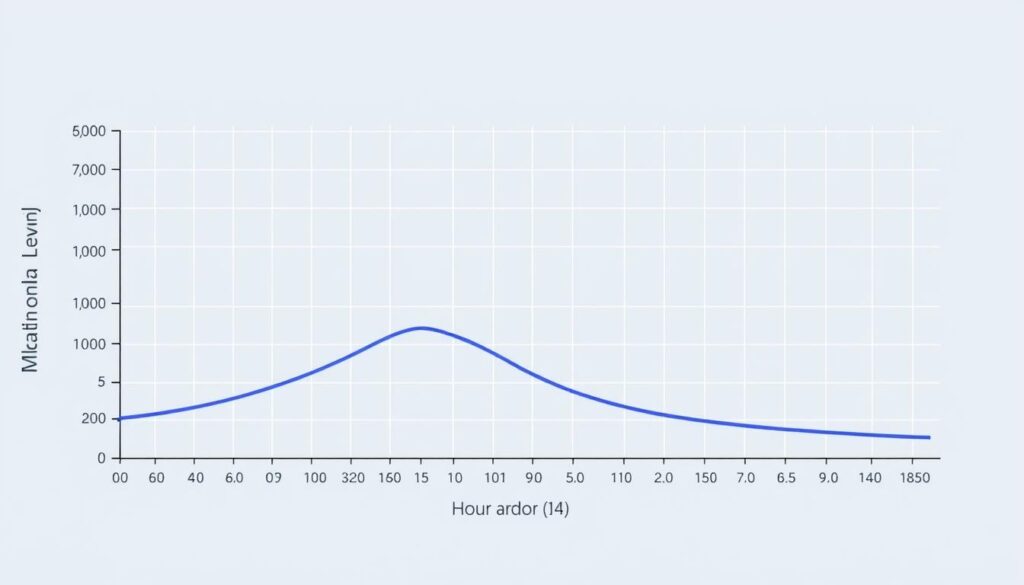
Factors Affecting How Long Melatonin Lasts
Several factors can influence how long melatonin remains active in your system:
Age
As you age, your metabolism slows down. This means melatonin may stay in your system longer if you’re older, potentially causing morning drowsiness.
Dosage
Higher doses of melatonin will naturally take longer to clear from your system. This is why starting with the lowest effective dose is recommended.
Body Weight
Your body weight and composition affect how quickly your body processes melatonin. Generally, people with higher body weight may need slightly higher doses.
Medications
Certain medications can interact with melatonin, either extending or shortening its duration in your system. Blood thinners, immunosuppressants, and some antidepressants may interact with melatonin.
Caffeine and Alcohol
Both caffeine and alcohol can affect how melatonin works in your body. Caffeine can counteract melatonin’s effects, while alcohol may enhance drowsiness but disrupt sleep quality.
Light Exposure
Exposure to bright light, especially blue light from screens, can suppress natural melatonin production and potentially interfere with supplemental melatonin.
Safety Considerations and Potential Side Effects
While melatonin is generally considered safe for short-term use, it’s important to be aware of potential side effects and safety considerations before taking it.
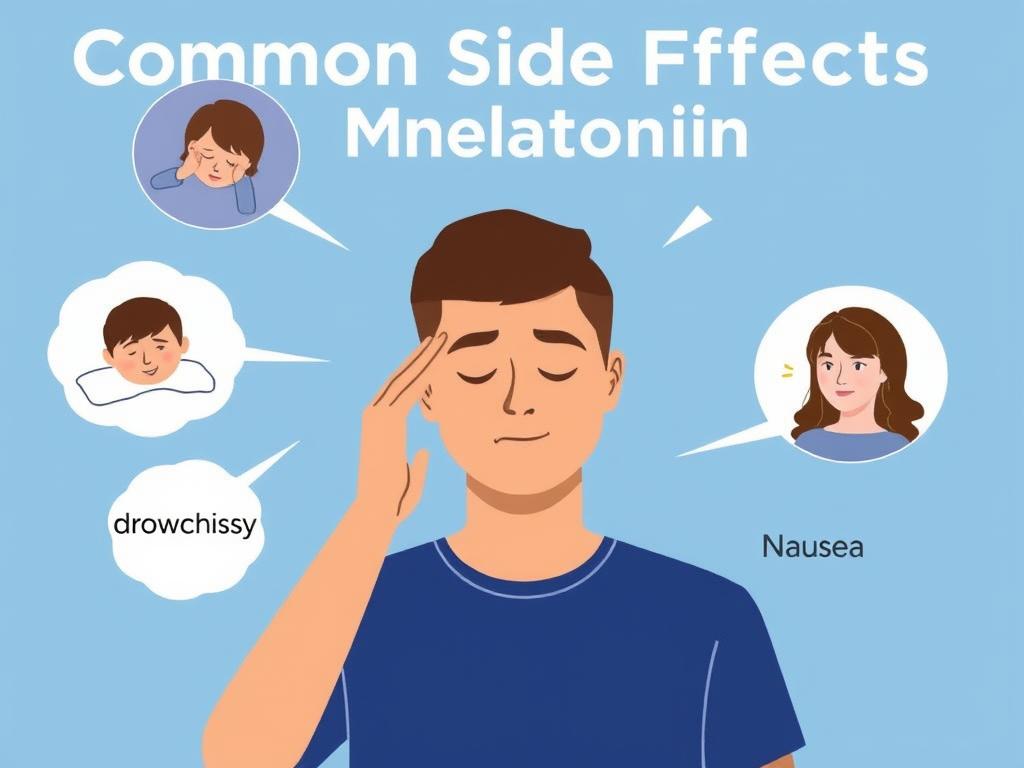
Common Side Effects
Most side effects of melatonin are mild and may include:
- Headache
- Dizziness
- Nausea
- Drowsiness (during the day)
- Vivid dreams or nightmares
Who Should Avoid Melatonin?
Melatonin isn’t appropriate for everyone. You should consult with a healthcare provider before taking melatonin if you:
- Are pregnant or breastfeeding
- Have an autoimmune disorder
- Have a seizure disorder
- Have depression
- Take blood thinners
- Take blood pressure medications
- Take diabetes medications
Warning: Do not drive or operate heavy machinery within 4-5 hours of taking melatonin. The sedative effects can impair your reaction time and coordination.
Long-Term Use Considerations
Melatonin is generally recommended for short-term use (up to 1-2 months). The long-term effects of melatonin supplementation haven’t been extensively studied. If you find yourself needing melatonin regularly for longer periods, consult with a healthcare provider to address the underlying causes of your sleep issues.
Frequently Asked Questions About Melatonin
Can melatonin work immediately?
No, melatonin doesn’t work immediately. Even the fastest-acting forms (like sublingual tablets) typically take at least 15-20 minutes to begin working. Most forms take 30-60 minutes to take effect. For best results, take melatonin 30-60 minutes before you plan to sleep.
Is 10mg of melatonin too much?
For most adults, 10mg is considered a high dose of melatonin. Sleep experts typically recommend starting with much lower doses (0.5-3mg). Higher doses don’t necessarily work better and may increase the risk of side effects like headaches, dizziness, and daytime drowsiness. Always start with the lowest effective dose.
Will taking melatonin cause my body to stop producing it naturally?
Current research hasn’t shown that taking melatonin supplements reduces your body’s natural production. However, this is why many experts recommend using melatonin for short periods rather than continuously. If you’re concerned, consider using melatonin only when necessary rather than every night.
How long is it safe to take melatonin?
Melatonin is generally considered safe for short-term use, typically 1-2 months. If you don’t notice benefits after a week or two, it may not be effective for your specific sleep issues. For chronic sleep problems, consult with a healthcare provider to address underlying causes rather than relying on melatonin long-term.
Does melatonin make it hard to wake up?
Some people may experience morning grogginess or difficulty waking up after taking melatonin, especially with higher doses or when taken too late at night. To minimize this effect, take the lowest effective dose 1-2 hours before bedtime, and avoid taking it in the middle of the night if you wake up.
Conclusion: Finding Your Optimal Melatonin Timing

Melatonin can be an effective tool for managing occasional sleep difficulties when used correctly. For most people, melatonin begins working within 20-40 minutes and reaches peak effectiveness around 1 hour after taking it. The effects typically last for 4-8 hours, depending on the formulation and individual factors.
Finding your optimal melatonin timing and dosage may require some experimentation. Start with a low dose (0.5-3mg) taken 30-60 minutes before your desired bedtime. Pay attention to how your body responds and adjust accordingly. Remember that melatonin works best when used as part of a comprehensive sleep hygiene practice that includes consistent sleep schedules, a comfortable sleep environment, and limited screen time before bed.
If you continue to experience sleep problems despite trying melatonin, consult with a healthcare provider. Persistent sleep issues may indicate an underlying condition that requires different treatment approaches.
Get Your Free Sleep Assessment
Discover your personal sleep profile and receive customized recommendations to improve your sleep quality.
Improve Your Sleep Quality
Subscribe to our newsletter for science-backed sleep tips, the latest research on melatonin, and exclusive guides to help you get better rest.
Transform Your Sleep Quality
Download our comprehensive sleep guide with expert tips on using melatonin effectively, plus natural strategies to improve your sleep quality.

